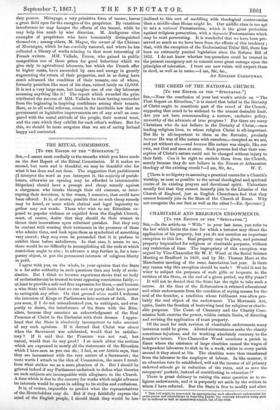THE RITUAL COMMISSION. [TO THE EDITOR OF THE " SPECTATOR."]
assent most cordially to the remarks which you have made on the first Report of the Ritual Commission. If it makes no second, but rests and is thankful, we may be thankful also for what it has done and not done. The suggestion that parishioners (I interpret the word as you interpret it, the majority of parish- ioners, otherwise an opening may be afforded to interminable litigation) should have a prompt and cheap remedy against a clergyman who breaks through their old customs, so inter- rupting their devotions, is the wisest, I conceive, that could have been offered. It is, of course, possible that no such cheap remedy may be found, or none which clerical and legal ingenuity to- gether may not evade. Those who wish to see Ritualists ex- posed to popular violence or expelled from the English Church, must, of course, desire that they should do their utmost to thrust their innovations upon reluctant parishes. But they may be content with wearing their vestments in the presence of those who admire them, and look upon them as symbolical of something very sacred ; they may even be persuaded that it is profane to exhibit them before unbelievers. In that case, it seems to me, there would be no difficulty in accomplishing all the ends at which restriction ought to aim ; to advance a step further is, for a tem- porary object, to put the permanent interests of religious liberty in peril.
I agree with you, on the whole, in your opinion that the State is a far safer authority in such questions than any body of eccle- siastics. But I think so because experience shows that no body of ecclesiastics can be trusted to treat opposing convictions fairly,— at least to provide a safe and free expression for them,—and because a wise State will incist that no one sect or party shall have power to extinguish any other. On that ground alone could I welcome the intrusion of Kings or Parliaments into matters of faith. But you seem, if I do not misunderstood you, to anticipate, and even partly to desire, the interference of the State with the Ritu- alists, because they associate an acknowledgment of the Real Presence of Christ iu the Eucharist with their dresses. I appre- hend that the State is absolutely incompetent to take account of any such opinions. If it decreed that Christ was absent when the Sacrament was celebrated, would that be satisfac- tory ? If it said that the Presence was not real, but unreal, would that do any good? I as much abhor the notions which are expressed in nearly all the statements of the Ritualists which I have seen as you can do ; I feel, as our Article says, that they are inconsistent with the very nature of a Sacrament ; the more worth I attach to the idea of Communion, the more I revolt from what strikes me as a mere phantom of it. But I should be grieved indeed if any Parliament undertook to define what theories on such subjects are incompatible with allegiance to the Church. A time which is due to the country for works which might advance its interests would be spent in adding to its strifes and confusions.
It is, of course, impossible to predict what the representatives of the Householders may do. But if they faithfully express the mind of the English people, I should think they would be less
inclined to this sort of meddling with theological controversies than a middle-class House might be. Our middle class is too apt to mix a national Protestantism, which is the great protection against religious persecution, with a dogmatic Protestantism which may be most persecuting. It is wonderful that we have been pre- served so much as we have been from the effects of this tendency ; that, with the exception of the Ecclesiastical Titles' Bill, there has been no extremely panical legislation since the Reform Bill of 1832. I do not know whether ten-pounders could be trusted in the present emergency not to commit some great outrage upon the principles of toleration. I trust our new rulers will respect them in deed, as well as in name.—I am, Sir, &c., AN ENGLISH CLERGYMAN.






























 Previous page
Previous page